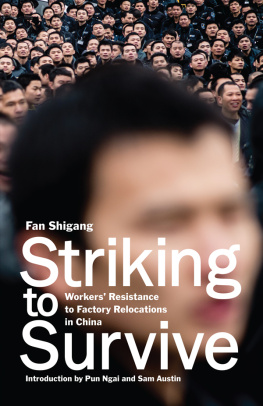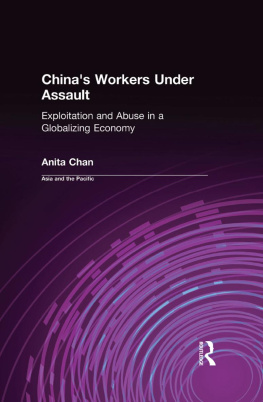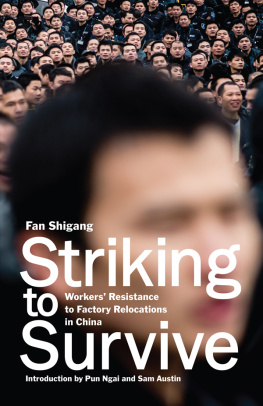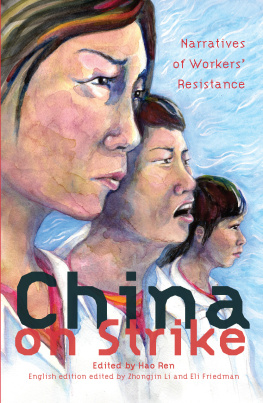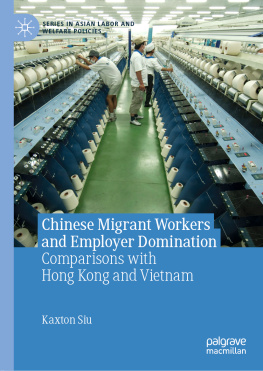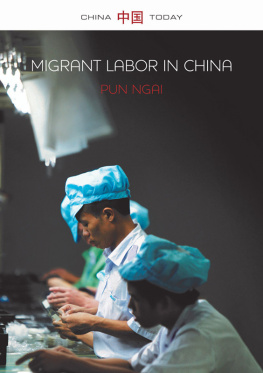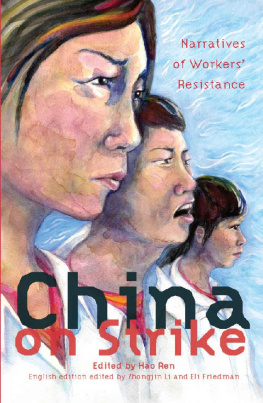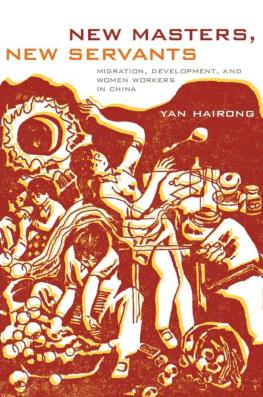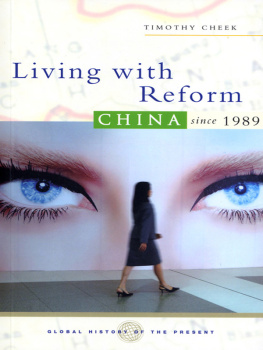This is a unique book that is a must-read for anyone concerned with the fate of Chinese workers. It vividly presents workers unfiltered voices about their experiences during two strikes in south China, recorded from multiple vantage pointsto strike or not to strike, their initial enthusiasm, their distrust of their peers and representatives, internal divisions, and the uncertainty of what to do next. No academic treatise could possibly capture the circumstances and state of mind of Chinese workers as well as this book.
Anita Chan, coeditor ofThe China Journal
The global economic crisis has intensified class struggle all around the world. In China, the party-state has strengthened repression over workers who go on strike and their supporters in an effort to maintain industrial peace and facilitate industrial relocation as economic growth has slowed. Through detailed case studies and in-depth interviews with workers, this timely book shows how Chinese migrant workers defend their labor rights and struggle to survive through large-scale political and economic restructuring.
Chris King-Chi Chan, City University of Hong Kong
Striking to Survive brilliantly documents the struggles in the past few years of Chinas migrant workers in two major factories in the Pearl River Delta at the center of the worlds workshop. The testimonies of their precious experiences challenge the prevalent nationalist narrative about Chinese workers stealing American jobs and illustrate that Chinese workers are fighting similar battles against neoliberalism as workers everywhere else.
Hsiao-Hung Pai, author ofScattered Sand: The Story of Chinas Rural Migrants
Leftists of all persuasions must try to come to grips with questions about the Chinese labor movement. Is China a capitalist economy? A state-capitalist economy? Will the emerging Chinese labor movement necessarily take the form of decentralized, local upheavals? If so, will that doom the movement to defeat or might it assist Chinese workers in avoiding the bureaucratic business unionism common in the West? Haymarket Books is to be congratulated for making it possible for rank-and-file Chinese workers to tell us their stories.
Staughton Lynd, coeditor with Alice Lynd ofRank and File: Personal Histories by Working-Class Organizers
Striking to Survive uses testimonies of leaders in two strikes in China to give us a window into why and how workers, with little training or support, boldly took collective action against their employers. Unlike most existing literature that observes Chinese labor relations from a distance, these oral histories take us deep into the nitty-gritty of each step in the disputes, as the participants lay bare the quandaries and frustrations they experienced at each turn. Experienced labor organizers will recognize that there is incredible potential in the collective agency of the workers, which is ultimately threatened by the lack of effective labor market institutions that satisfactorily address workers concerns. This book is an important read for anyone who seriously wants to understand workers in China today.
Katie Quan, Senior Fellow, UC Berkeley Center for Labor Research and Education
As American workers get stripped of union contracts and bargaining rights, more will be forced to rely on strike activityin the absence of any supportive legal framework. Labor militants abroad, like the author of Striking to Survive, know a lot about this difficult terrain, since they daily risk police harassment and imprisonment for organizing work stoppages. This book is a Chinese import with much to teach US rank and filers. Its invaluable lessonson strike tactics, strategy, and workplace committee buildingare a just-in-time delivery.
Steve Early, former CWA strike organizer and author ofSave Our Unions: Dispatches From A Movement in Distress
Striking
to
Survive
Workers Resistance
to Factory Relocations
in China
By Fan Shigang
Translated by Henry Moss
2018 Fan Shigang
Published in 2018 by
Haymarket Books
P.O. Box 180165
Chicago, IL 60618
773-583-7884
www.haymarketbooks.org
ISBN: 978-1-60846-910-9
Trade distribution:
In the US, Consortium Book Sales and Distribution, www.cbsd.com
In Canada, Publishers Group Canada, www.pgcbooks.ca
In the UK, Turnaround Publisher Services, www.turnaround-uk.com
All other countries, Ingram Publisher Services International,
This book was published with the generous support of Lannan Foundation and Wallace Action Fund.
Cover design by Rachel Cohen. Cover image Stringer, AP Images, of workers from Sui Bao Security Transport Co. on strike for higher salaries, blocking a road in Guangzhou, south Chinas Guangdong province in February 2014.
Printed in Canada by union labor.
Library of Congress Cataloging-in-Publication data is available.
10 9 8 7 6 5 4 3 2 1
The Third Round of Migrant Labor Struggles in Post-Socialist Guangdong:
Introduction to the English edition
Pun Ngai and Sam Austin
The global resurgence of right-wing populism associated with figures such as Trump in the United States, Putin in Russia, and Modi in India reflects, among other things, the combination of mass resentment against globalism (what the left used to call neoliberal globalization) and frustration with repeated betrayals by nominally left-leaning politicians. In the United States, in particular, one sentiment that unites the new populist right with many supporters of the new populist left (associated with Bernie Sanders and the Democratic Socialists of America) is the desire to save our jobsfrom Communist China, among other imagined threats.
But is China stealing jobs from the United Statesor any other country, for that matter? Many other commentators The high tide of outsourcing took place in the 1980s, when many manufacturing jobs moved from cities in the northern United States to places such as Mexico, Taiwan, and other parts of the United States with weaker unions and lower wages. Many other jobs were replaced by automation. If mainland China stole jobs from anyone, it was not from the United States but from Mexico and parts of East Asia in the 1990s and 2000s. But now, in 2017, protectionists in even those countries have lost much of the material basis for China-bashing. Just as automobile workers in Detroit are held responsible for pushing capital out of town by demanding a dignified way of life, the new generation of workers in Chinas workshop of the worldthe Pearl River Delta (PRD)have significantly pushed wages up over the last fifteen years. This, combined with real estate speculation, withdrawal of government tax benefits and infrastructure subsidies, higher social welfare packets, and fierce interfirm competition, has driven firms to poorer parts of China or other countries such as Bangladesh, Cambodia, and Myanmar.
This book documents the struggles of Chinese workers against such outsourcing in two factories: one supplying furniture for transnational corporations such as Walmart and the other supplying garments for the Japanese clothing brand Uniqlo. Both illustrate that Chinese workers are not only

